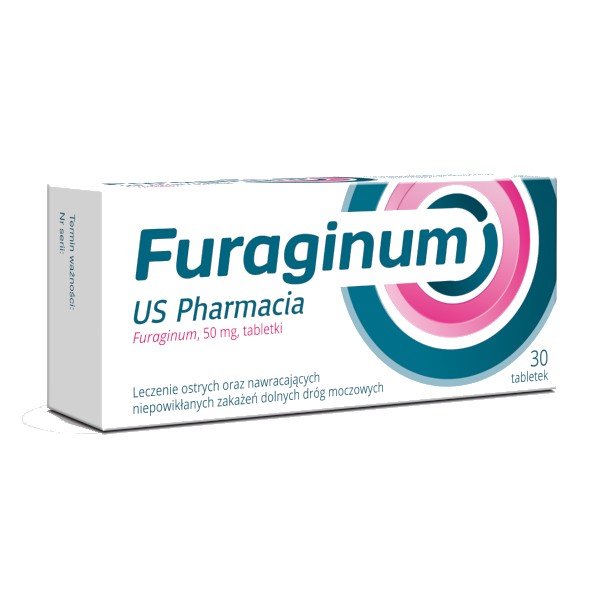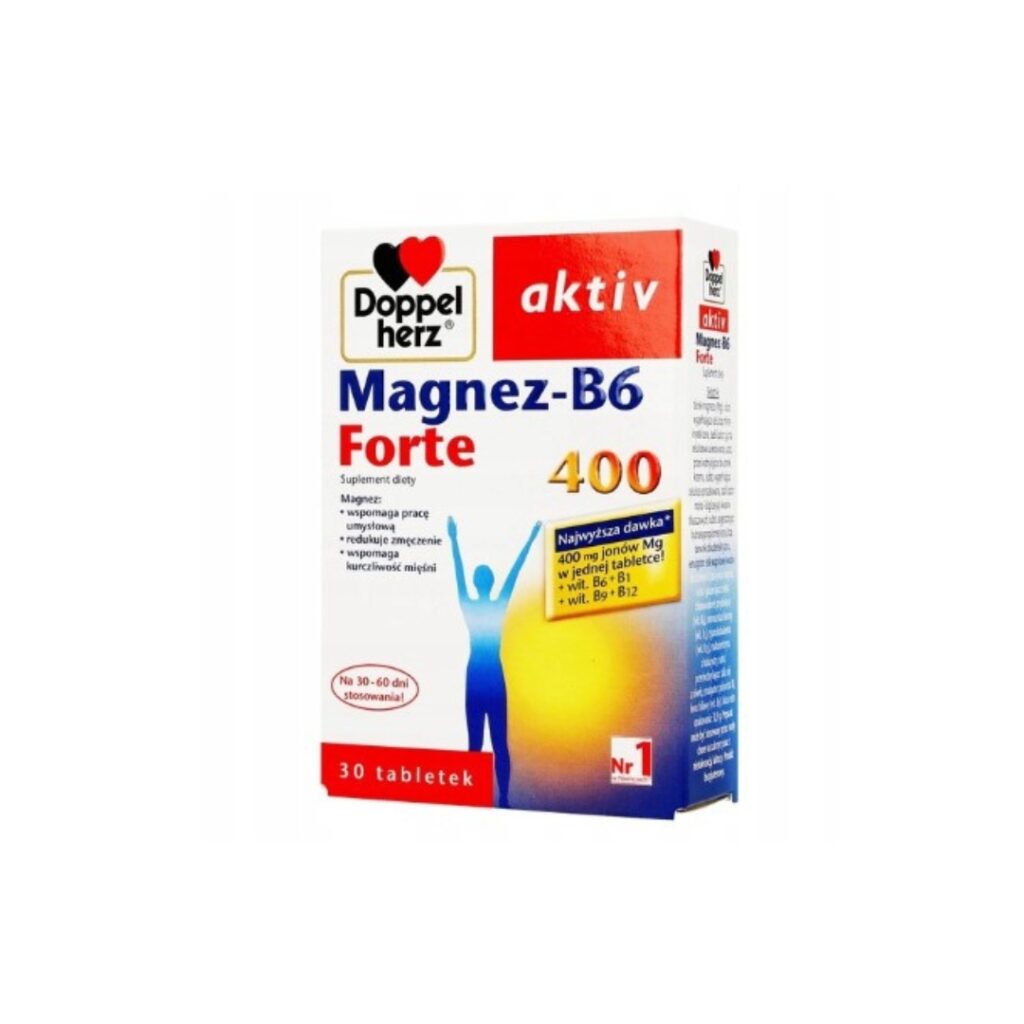Furaginum 50mg (30 Tablets)
Furaginum is an OTC drug used to treat acute and recurrent uncomplicated lower urinary tract infections
Furaginum contains furagina as an active ingredient. Furagina is a nitrofuran derivative that inhibits the growth of both gram-positive and gram-negative bacteria that cause urinary tract infections.
Symptoms
The indication for the use of Furaginum US Pharmacia is:
- treatment of acute and recurrent uncomplicated infections of the lower urinary tract.
If after 7-8 days there is no improvement or the patient feels worse, see a doctor.
Active substance: Furaginum
Composition
| 1 tablet contains: | 50 mg furagin (Furaginum) |
| The other ingredients are: lactose monohydrate, pregelatinized starch, sucrose, polysorbate 80, and stearic acid. |
Dosage
Furaginum should always be used exactly as described in the package leaflet or according to the doctor’s instructions. Check with your doctor or pharmacist if you are not sure.
Adults and adolescents over 15 years of age.
First day of treatment: 2 tablets 4 times a day; next days: 2 tablets 3 times a day.
Furaginum should be taken orally with meals containing protein, which increases the absorption of the drug.
The drug is used for 7-8 days. If, after this time, symptoms worsen or do not improve, see your doctor.
If necessary, the treatment can be repeated after 10-15 days.
Use of the drug in children and adolescents
Furaginum should not be used in children and adolescents under 15 years of age.
Contraindications
Do not use Furaginum:
- If you are allergic (hypersensitive) to furaginum, other nitrofuran derivatives or any of the other ingredients of Furaginum US Pharmacia.
- During the first trimester of pregnancy.
- From 38 weeks onwards and during delivery, due to the risk of haemolytic anemia (anemia related to the breakdown of red blood cells) in the newborn.
- In children and adolescents under 15 years of age.
- If you have renal insufficiency and laboratory tests show a creatinine clearance below 60 ml / min or elevated serum creatinine levels.
- If you have been diagnosed with polyneuropathy (a disorder of the nervous system), for example due to diabetes.
- If you have a deficiency of glucose-6-phosphate dehydrogenase (an enzyme involved in the metabolism of red blood cells).
Application notes
Taking Furaginum with food and drink
Furaginum should be taken orally during meals containing protein, which increases the absorption of the drug.
Furaginum contains lactose and sucrose.
Each tablet contains 18.8 mg of lactose monohydrate and 10 mg of sucrose. If you have been diagnosed with an intolerance to some sugars, consult your doctor before taking the drug.
Contents
Yellow-orange, uncoated tablets, flat on both sides. Cardboard boxes with 30 tablets in blisters.
Storage
Below 25°C
Manufacturer
Warnings
If the patient is subject to the circumstances described below, the use of Furaginum US Pharmacia should be discussed with a doctor.
- If you suffer from kidney or liver problems, nervous system disorders, anemia, electrolyte disturbances, vitamin B deficiency and folic acid deficiency, or lung disease.
- If you have diabetes, furagine can damage your nerves.
- Peripheral nerve damage has been observed in patients treated with nitrofuran derivatives. In severe cases, this disorder may be irreversible and may be life-threatening. Therefore, the patient should stop using Furaginum US Pharmacia if symptoms of nervous system dysfunction (tingling, numbness, feeling of running currents) occur.
- If a patient develops fever, chills, cough, chest pain, shortness of breath while taking Furaginum US Pharmacia. These may be signs of acute pulmonary reactions and are seen in patients sometimes treated with nitrofuran derivatives. In the event of such symptoms, treatment should be stopped immediately – these symptoms usually disappear quickly or very quickly after discontinuation of the drug. If the drug has been used for a long time, the severity of symptoms and their improvement after discontinuation of the drug depends on the duration of the treatment continuation after the first undesirable effects. It is essential to recognize the side effect as soon as possible and stop the medication. Lung dysfunction may be irreversible. Chronic reactions have occurred in patients taking furagine for more than 6 months.
- If you are taking this medicine for a long time – you may need a blood test to check the number of white blood cells and the function of your kidneys and liver.
- If you develop severe and persistent diarrhea during or after treatment. This could be a symptom of pseudomembranous enteritis, a complication sometimes seen with antibacterial drugs. Contact your doctor as soon as possible and do not take anti-diarrheal medications that inhibit bowel movements.
Pregnancy and lactation
If you are pregnant or breastfeeding, think you may be pregnant or are planning to have a baby, ask your doctor or pharmacist for advice before taking this medicine.
Furaginum should not be used in the first three months of pregnancy (1st trimester) or from the 38th week and in childbirth, because furaginum may cause haemolytic anemia in the newborn. Particular caution should be exercised when used in the last three months of pregnancy (third trimester).
Furaginum should not be used during breastfeeding. Furagin passes into breast milk and may harm a breastfed baby.
Driving vehicles
There are no data on the effect of furaginium on the ability to drive and use machines. However, some patients may experience side effects that may affect the ability to drive (dizziness, somnolence, visual disturbances).
Overdosage
As the drug is eliminated from the body by the kidneys, the risk of overdose is increased in patients with impaired renal function. In case of overdose, the following symptoms may occur: headache, dizziness, allergic reactions, nausea, vomiting, anemia.
In the event of overdose, gastric lavage and intravenous fluid administration are recommended. Complete blood counts, laboratory tests of liver function and monitoring of lung function are recommended. In severe cases, hemodialysis should be performed.
Interactions with other drugs
If you are taking any of the medications listed below, consult your doctor or pharmacist before using Furaginum US Pharmacia.
- Nalidixic acid (antibiotic) – furagin inhibits its bacteriostatic effect.
- Aminoglycosides and tetracyclines (antibiotics) – enhance the antibacterial effect of furagin.
- Chloramphenicol and ristomycin (antibiotics) – increase the toxic effects of furagin on blood cells.
- Probenecid (in high doses) and sulfinpyrazone (drugs that increase the excretion of uric acid in the urine) – reduce the excretion of furagin and can cause its accumulation in the body, increasing its toxicity and reducing the concentration in the urine, and consequently lead to reduced effectiveness.
- Antacids containing magnesium trisilicate – reduce the absorption of furagin.
- Atropine – delays the absorption of furagin, but the overall amount of the absorbed substance does not change.
- B vitamins – increase the absorption of furagin. Impact on laboratory testsWhen using furagin, urine glucose results with Benedict’s and Fehling’s solutions may lead to false-positive results. Urine glucose measurements by enzymatic methods are usually normal.
Side effects
Like all medicines, this medicine can cause side effects, although not everybody gets them.
Common side effects (affects 1 to 10 patients in 100):
- nausea, excessive gas emission;
- headaches.
Side effects that may affect up to 1 in 100 patients:
- cyanosis, megaloblastic anemia (anemia due to vitamin B12 or folate deficiency) or haemolytic anemia (caused by excessive breakdown of red blood cells);
- dizziness, somnolence, visual disturbances, peripheral nerve disorders (also acute or irreversible, especially in patients with renal failure, anemia, diabetes, electrolyte disturbances, vitamin B deficiency);
- respiratory hypersensitivity reactions
- acute reactions – manifested by fever, chills, cough, chest pain, shortness of breath, effusion into the chest, changes in the radiographs of the lungs and an increase in a specific type of white blood cells called eosinophils; they usually disappear quickly or very quickly after drug discontinuation;
- chronic reactions – including pulmonary fibrosis and disseminated interstitial pneumonia; the severity of symptoms and their reversibility after drug discontinuation depends on the duration of continuation of treatment after the appearance of the first adverse effects; after identifying an adverse reaction, it is necessary to discontinue the drug immediately; lung dysfunction may be irreversible;
- constipation, diarrhea, dyspeptic symptoms (e.g. feeling full after meals, flatulence), abdominal pain, vomiting, inflammation of a salivary gland, pancreatitis, pseudomembranous enteritis;
- alopecia, severe skin reactions with peeling or blistering (exfoliative dermatitis, erythema multiforme, Stevens-Johnson syndrome or bullous erythema multiforme);
- fever, chills, malaise, infections with microorganisms resistant to furagin;
- itching, hives, anaphylactic reactions (sudden local or systemic allergic reactions), angioedema (a disease of the skin and subcutaneous tissue in which swelling may be difficult to breathe, most often around the face, throat, tongue), rash;
- symptoms of drug-induced hepatitis, cholestatic jaundice (caused by an obstruction in the drainage of the bile), necrosis of the liver parenchyma.
Nitrofuran derivatives may negatively affect the function of the testicles and reduce sperm motility, reduce sperm secretion and lead to unfavorable changes in sperm structure.




